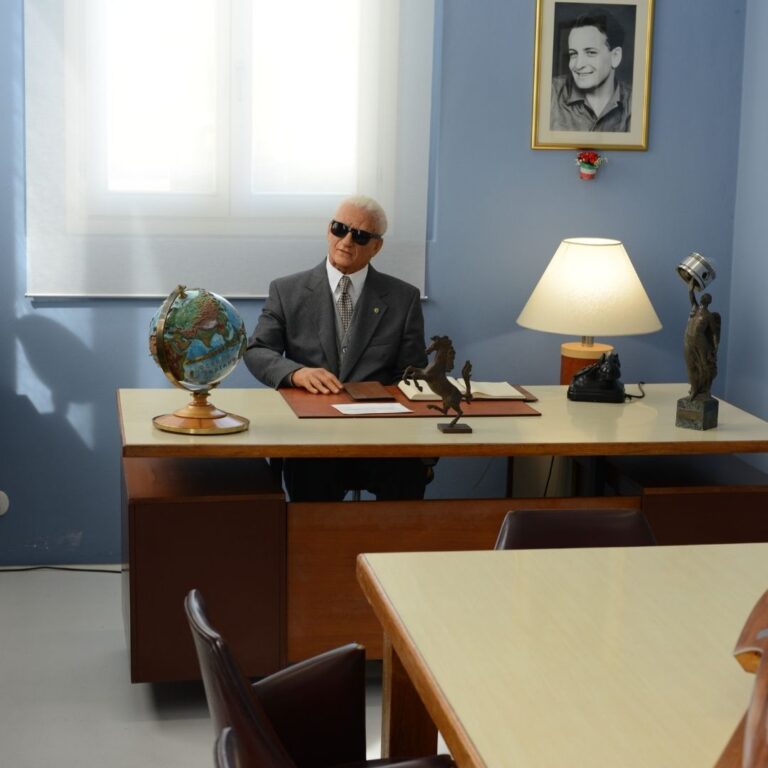Enzo Ferrari, a monumental figure, founded the iconic Ferrari marque, synonymous with speed, luxury, and engineering excellence. His life was a relentless pursuit of automotive perfection, both in racing and high-performance sports cars. This article outlines his journey from humble beginnings to his enduring legacy.
Early Years: The Spark of Passion
Born in Modena, Italy in 1898, Enzo’s early exposure to his father’s metal workshop hinted at his mechanical aptitude. A 1908 motor race ignited his lifelong passion for racing. Despite considering other paths, the allure of automobiles proved strongest. World War I and family tragedies instilled resilience. Rejected by FIAT, he found work as a test driver for CMN and began his racing career in 1919.
From Driver to Manager: The Alfa Romeo Era
Joining Alfa Romeo in 1920, Enzo excelled as a driver, securing his first Grand Prix win in 1923. In 1929, he founded Scuderia Ferrari, initially a racing team for Alfa Romeo cars, which evolved into their official racing division. Retiring from driving in 1931 to manage the team, he oversaw considerable success, employing legendary drivers and adopting the iconic Prancing Horse emblem. Growing tensions with Alfa Romeo led to his departure in 1939, with a stipulation preventing him from using the Ferrari name for four years.
The Birth of a Legend: Founding Ferrari
Despite the name restriction, Enzo established Auto Avio Costruzioni (AAC) in 1939, focusing on aircraft parts during WWII. The Tipo 815 racing cars in 1940 were his first independent designs. Wartime bombing led to relocation to Maranello in 1943. In 1945, he officially adopted the name Ferrari S.p.A. The first Ferrari-badged car, the 125 S, debuted in 1947, achieving early racing success, including a Le Mans victory in 1949.
Triumph on the Track and Road: Key Milestones and Achievements
Ferrari entered Formula One in 1950, the only team to compete in every season. Their first F1 win came in 1951. The 1950s saw championship wins with Ascari and Fangio. Ferrari dominated sports car racing, winning Le Mans six consecutive times (1960-1965). Under Enzo, Ferrari achieved over 5,000 race wins and 25 world titles. Iconic road cars like the 250 series (including the GTO), 275 GTB, Daytona, Testarossa, and the Enzo-approved F40 defined high-performance and luxury. Enzo also championed aerodynamic principles, lightweight materials, and the signature V12 engine, later embracing turbocharging.
The Ferrari Ethos: Brand Development and Evolution
Enzo prioritized racing, viewing road cars as a means to fund it. He cultivated exclusivity through limited production, establishing Ferrari as a symbol of luxury, performance, and Italian style. His autocratic management style fostered intense competition among drivers.
A Personal Life: Family and Relationships
Married to Laura Dominica Garello in 1923, their son Dino’s tragic early death deeply affected Enzo. He later had a son, Piero Lardi Ferrari, who became vice chairman. Enzo was reserved, earning the nicknames “il Commendatore” and “il Drake.”
Financial Standing
While exact figures are unavailable, Alfa Romeo’s acquisition of Scuderia Ferrari made Enzo wealthy. Selling stakes to Fiat in 1969 and 1988 further indicates his significant financial success.
A Lasting Imprint: Legacy and Impact
Enzo revolutionized sports car design and racing safety. Ferrari’s racing dominance and iconic road cars cemented its global prestige. He founded Scuderia Ferrari, a racing dynasty with unparalleled F1 success. His company pioneered numerous technological and design innovations, including the V12 engine and aerodynamic principles. The Prancing Horse emblem remains a powerful global symbol.
Final Lap: Death and Remembrance
Enzo Ferrari passed away in 1988 at 90. The F40 was the last car he approved. Posthumous honors include induction into the International Motorsports Hall of Fame and the Automotive Hall of Fame. Ferrari continues as a leading luxury brand, his legacy enduring.
Enzo Ferrari’s life exemplifies passion, determination, and the pursuit of a dream. From racing aspirations to a global empire, his focus on motorsport victory and high-performance road cars transformed the automotive world. The Ferrari brand remains a testament to his enduring legacy of Italian excellence.


